|
|
|
Sort Order |
|
|
|
Items / Page
|
|
|
|
|
|
|
| Srl | Item |
| 1 |
ID:
171704
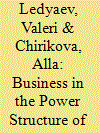

|
|
|
|
|
| Summary/Abstract |
This article is based on the outcomes of a research project conducted in five small Russian towns. In all the communities, big business had significant power potential, but its direct involvement in local politics was limited since the ‘power vertical’ instituted under Putin meant that decisions on the most important local issues were made at regional and federal levels. Small and medium-sized businesses were also not actively involved in local politics. Unlike big business, however, they were more vulnerable to and dependent on local administrations. Relations between local authorities and business actors seemed close and cooperative; however, their interactions often had no civic component and were based almost exclusively on mutual interest.
|
|
|
|
|
|
|
|
|
|
|
|
|
|
|
|
| 2 |
ID:
124767
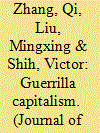

|
|
|
|
|
| Publication |
2013.
|
| Summary/Abstract |
In this article, we propose a causal relationship between a region's communist revolutionary legacy before 1949 and the variation in private sector development after 1949. In the case of Zhejiang, the pre-1949 revolutionary experience led to the power struggle between two elite groups, the guerrilla cadre group and the southbound cadre group, in the province after 1949. As the weak side, guerrilla cadres were willing to protect local economic interests in exchange for local popular support, which improved their odds of political survival. As a result, in contrast with counties where the guerrilla forces were historically weak, counties with strong guerrilla forces before 1949 saw significantly more robust private sector development throughout much of the Mao and post-Mao periods. In this article we provide preliminary historical and statistical evidence to support this hypothesis.
|
|
|
|
|
|
|
|
|
|
|
|
|
|
|
|
| 3 |
ID:
134125
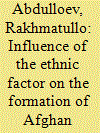

|
|
|
|
|
| Publication |
2014.
|
| Summary/Abstract |
The formation of a unified state in Afghanistan is deeply affected by the many ethnic contradictions that are greatly hindering its current development. They primarily relate to building a multiethnic state, the traditional domination of the Pashtun feudal elite in the power structures, the place and role of the non-Afghan peoples in the country's economic and political life, and the relations among the main ethnic groups that populate the country.
This article examines the sources of these ethnic problems as the centralized state completed its formation in Afghanistan and how they are expressed in the country's current historical mythology.
|
|
|
|
|
|
|
|
|
|
|
|
|
|
|
|
| 4 |
ID:
134124
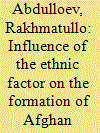

|
|
|
|
|
| Summary/Abstract |
The formation of a unified state in Afghanistan is deeply affected by the many ethnic contradictions that are greatly hindering its current development. They primarily relate to building a multiethnic state, the traditional domination of the Pashtun feudal elite in the power structures, the place and role of the non-Afghan peoples in the country's economic and political life, and the relations among the main ethnic groups that populate the country.
This article examines the sources of these ethnic problems as the centralized state completed its formation in Afghanistan and how they are expressed in the country's current historical mythology.
|
|
|
|
|
|
|
|
|
|
|
|
|
|
|
|
| 5 |
ID:
131712
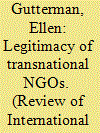

|
|
|
|
|
| Publication |
2014.
|
| Summary/Abstract |
This article develops theoretical insights concerning the legitimacy of non-profit Transnational Non-Governmental Organisations (TNGOs) in global governance. The research compares the advocacy initiatives of Transparency International (TI), the leading TNGO in the international regime of anti-corruption, in Germany and France during the 1990s. The main argument is that the legitimacy of TNGOs is a relational concept: it is granted or denied in a relationship between at least two parties, in which actor attributes play a role but are not decisive. Only such a relational conception can explain why a given TNGO is granted legitimacy in one context and denied it in another. In addition, legitimacy matters. Although insufficient on its own, legitimacy is a necessary condition for effective advocacy, which TNGOs can generate endogenously. To the extent that the legitimacy of TNGOs depends on their acceptance by dominant groups and powerful decision-makers, therefore, 'legitimate' TNGOs may function to sustain rather than challenge the structures of power which condition global outcomes in ways that are often contrary to the goals of equality, fairness, and justice. Thus to assess the impact of TNGOs in global governance, one must examine which TNGOs have been granted (or denied) legitimacy and influence, and why.
|
|
|
|
|
|
|
|
|
|
|
|
|
|
|
|
| 6 |
ID:
132732
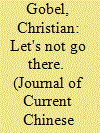

|
|
|
|
|
| Publication |
2014.
|
| Summary/Abstract |
Field research in China often requires the researcher to cooperate with two kinds of actors: research collaborators, such as those at universities or official think tanks, and local officials. These actors facilitate or enhance field access, but such access comes at the price of a potential "pre-selection bias" in data collection. Some scholars have argued that dependence on these "gatekeepers" introduces a significant bias into research outcomes. I argue, however, that the constraints faced by China scholars in their field studies are not absolute, but function by degree. The CCP is monolithic neither in its organization nor in the thoughts of its agents, and close collaboration with local partners can help remove normative bias rather than necessarily introducing it. Most importantly, an argument built exclusively on the power of structural constraints discounts China scholars' most crucial abilities: to learn, to think critically and to research holistically.
|
|
|
|
|
|
|
|
|
|
|
|
|
|
|
|
| 7 |
ID:
081822
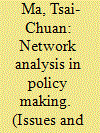

|
|
|
| 8 |
ID:
108531
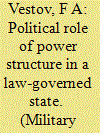

|
|
|
| 9 |
ID:
153384
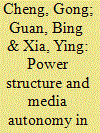

|
|
|
|
|
| Summary/Abstract |
How do Chinese media derive the autonomy to practice relatively freely, and how are they deprived of it? By analyzing the case of Southern Weekend, this study proposes one crucial factor—the central–local power structure within the Party’s censorship system to explain the dramatic changes of media autonomy in China. It argues that the divergence between the local authority and the central propagandists in dealing with the local media has guaranteed the autonomy of local media practitioners. The autonomy becomes eroded later when the central authority rationalizes the nomenklatura system of the regulatory bodies. By nurturing loyal agents at the local level, the central authority successfully eases the tension within the central–local power structure and strengthens its control over the regionally-based media outlets.
|
|
|
|
|
|
|
|
|
|
|
|
|
|
|
|
| 10 |
ID:
131812
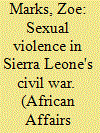

|
|
|
|
|
| Publication |
2014.
|
| Summary/Abstract |
Rape and sexual violence loom large in the study of civil war in Africa. Sierra Leone has been one of the most prominent cases for establishing rape as a 'weapon of war', yet little is known about how sexual violence was understood by commanders or combatants within the Revolutionary United Front (RUF). Mainstream analyses of armed groups and civil war rarely engage with gender dynamics, despite their centrality to war making, power, and violence; and research that does focus on sexual violence tends to overlook the complex internal dynamics of the groups responsible. This article examines the internal gender dynamics of the RUF from the perspective of male and female members in seeking to understand the perpetration of sexual violence. It shows that both formal and informal laws and power structures existed to regulate gender relations and control sexual behaviour within the group. It identifies four categories of women - non-wives, unprotected wives, protected wives, and senior women - and shows that women's interests and experiences of sexual violence were not homogeneous, but were instead shaped by their status within the group. In this way, sexual violence, examined in social context, provides an entry point for understanding how power, protection, and access to resources are brokered in rebellion.
|
|
|
|
|
|
|
|
|
|
|
|
|
|
|
|
|
|
|
|
|